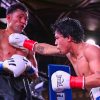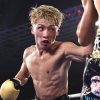By Ivan G. Goldman
Julio Cesar Chavez, Jr. claims he’s put in plenty of hard gym time for the rematch with Brian Vera Saturday, but he’s said that before when it wasn’t even remotely true.

Photo: Chris Farina/Top Rank
Freddie Roach, who trained him for three of his fights, says Chavez had a habit of not showing up for gym sessions. He’s also had infamous struggles with making weight. In his first outing against Vera he eventually weighed in at 172 and a half for a 168-pound contest. Vera fought him anyway and lost to three pencils wielded by California judges Gwen Adair, Carla Caiz, and Marty Denkin. Fans and fight writers have piled plenty of abuse on those three scores.
The first match, held Sept. 28 in Carson, California, a blue-collar town on the southern edge of Los Angeles, was witnessed by a crowd that started out very much pro-Chavez. But the judges’ decision was met with bafflement, anger, and a chorus of boos. The fans wanted the right guy to win, and that, they were sure, was Vera, a Texan few of them had ever seen before.
Chavez, the son of a Mexican icon, can’t seem to stay out of controversy. He’s been suspended and fined for marijuana, he once tested positive for a banned diuretic that’s supposed to take off weight in a hurry, and when he kayoed Andy Lee in June 2012 he apparently never provided a urine sample. Before the fight he said he couldn’t urinate and afterward he was whisked away. That very fishy scenario transpired in El Paso, Texas. And it basically repeated a previous non-encounter Chavez had with drug testing when he kayoed Marco Antonio Rubio in San Antonio in his previous fight. And San Antonio, Texas, is where Vera now hopes to get a fair shake on Saturday.
Chavez, now 28, may finally be reaching an age when he’ll have to build a career with his own two fists, not standing on the shoulders of his father’s reputation. He’s compiled a record of 47-1-1 (32 KOs) and does in fact have some talent, chiefly in the power and toughness departments. He’s a formidable body puncher.
Chavez took a lot of shots as he lost to the versatile Sergio Martinez, an extremely talented athlete, and still had enough left to knock him down in the twelfth round. It may have saved Chavez’s career. But punching power is of little use if a fighter can’t set up his shots or protect himself from what’s coming at him.
Chavez has reportedly contracted to pay Vera an extra $250,000 if he doesn’t make the 168-pound weight. The weigh-in on Friday should tell us something. But Vera, 23-7 (14 KOs), isn’t even a super middleweight. He’s a reasonably talented middleweight fighting eight pounds above his weight class in order to earn a paycheck and maybe make some history.
Both fighters are saying all the usual things about having a great training camp and etcetera.
Chavez’s own promoter, Bob Arum, has slammed Chavez’s flimsy commitment to his trade. The first Vera fight involved frantic messages involving the two teams, the promoter, and the California commission as new limits kept being set and the Chavez team kept pleading for a higher limit. Arum joked that the limit would be set at whatever Chavez happens to weigh. Even the HBO boxing website refers to Chavez’s “fragile” reputation.
The lead-up bout on HBO features Orlando Salido in his first WBO featherweight title defense against two-time Olympic Gold medalist Vasyl Lomachenko, who hits like a middleweight. With only one pro fight under his belt (a knockout victory over Jose Luis Ramirez) Ukrainian Lomachenko is being heralded as The Next Big Thing in the sport.
Las Vegas oddsmakers have made both Chavez and Lomachenko heavy favorites.
 Sick Justice: Inside the American Gulag, by New York Times best-selling author Ivan G. Goldman, was released in 2013 by Potomac Books, a University of Nebraska Press imprint. It can be purchased here.
Sick Justice: Inside the American Gulag, by New York Times best-selling author Ivan G. Goldman, was released in 2013 by Potomac Books, a University of Nebraska Press imprint. It can be purchased here.









